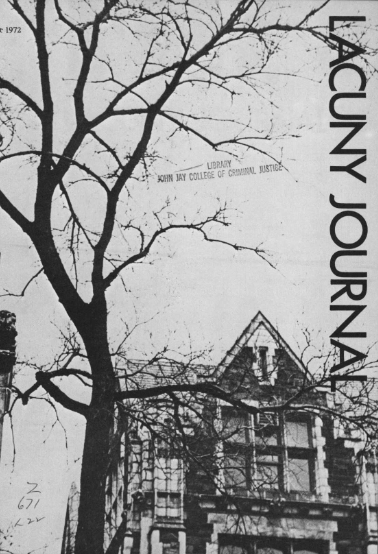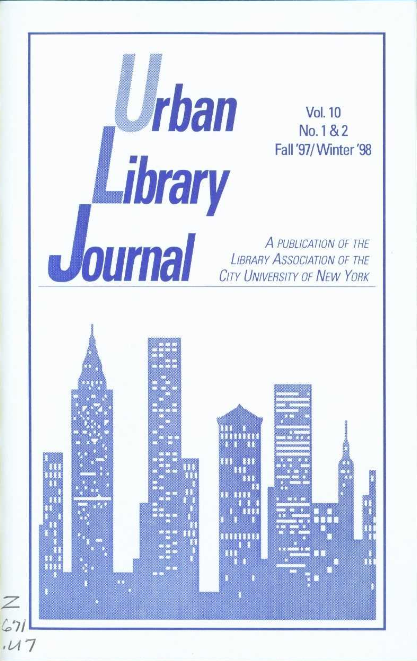The Office of Library Services is thrilled to announce the launch of Urban Library Journal on Academic Works’ Digital Commons platform. Published by the Library Association of the City University of New York (LACUNY), Urban Library Journal (ULJ) fills a gap in LIS scholarship by addressing the work of libraries and librarians in an urban setting.
Before it was Urban Library Journal
 In 1972, LACUNY launched its first journal, LACUNY Journal, as a means to make “the ideas of CUNY librarians known to each other and to colleagues in other departments of City University.” The Editorial Committee hoped to address a full range of subjects and perspectives – including controversial ones – in order to promote a free and open exchange of ideas and raise the professional goals of its membership. And it did just that. From profiles of CUNY libraries and librarians to articles about the relationship between libraries and open admissions to questioning the role ACRL plays in bringing libraries together, Volume 1, Issue 1 was a platform for the diverse voice, experiences, and perspectives present throughout CUNY Libraries.
In 1972, LACUNY launched its first journal, LACUNY Journal, as a means to make “the ideas of CUNY librarians known to each other and to colleagues in other departments of City University.” The Editorial Committee hoped to address a full range of subjects and perspectives – including controversial ones – in order to promote a free and open exchange of ideas and raise the professional goals of its membership. And it did just that. From profiles of CUNY libraries and librarians to articles about the relationship between libraries and open admissions to questioning the role ACRL plays in bringing libraries together, Volume 1, Issue 1 was a platform for the diverse voice, experiences, and perspectives present throughout CUNY Libraries.
In 1981, the LACUNY Journal was replaced by the Urban Academic Librarian, which expanded its scope and the conversation beyond CUNY, to librarians working in an urban academic setting. Michael O’Donnell, Chairperson of the LACUNY publications committee and a librarian at the College of Staten Island, introduced the first issue of this new publication with a call for change:
As the 1980s unfolded, urban academic librarians need to redefine their mission in order to achieve a balance between the academically desirable and the fiscally and physically feasible. By rejecting both the starry-eyed idealism of the Sixties and the “looking-out-for-number-one” cynicism of the Seventies, perhaps we can establish realistic and achievable goals. We hope this journal will help provide a free exchange of ideas.
Launch of Urban Library Journal
I n changing the name to Urban Library Journal in 1998, the members of the LACUNY publications committee opened the journal to all librarians working in an urban environment. The city, its institutions, and its people were under attack from politicians, their policies and their budgets. Editor Rolando Perez introduced the first issue under the journal’s new name by addressing the importance of its expanded scope:
n changing the name to Urban Library Journal in 1998, the members of the LACUNY publications committee opened the journal to all librarians working in an urban environment. The city, its institutions, and its people were under attack from politicians, their policies and their budgets. Editor Rolando Perez introduced the first issue under the journal’s new name by addressing the importance of its expanded scope:
“No true American lives in New York City,” commented Ronald Reagan while in office — a comment that though easily dismissed did set the tone for a certain attitude towards our cities. . .
This attitude, though somewhat tempered in the 90s, still domineers a lot of federal, state, and even local politics with respect to our cities. And though no politician today would make the same statement made by Reagan almost twenty years ago, a lot of the legislation that impact upon our cities, does reflect the unstated attitude of our politicians. It is reflected in the way our public education institutions have come under rhetorical and economic attack, it is reflected in the lack of funding for educational programs, and it is reflected in our elected officials’ attitudes towards the very institutions that support the cities, as for instance, our urban libraries.
As former co-editors Beth Evans and Sally Bowdoin note “shortly after the name change [to ULJ] the LACUNY publications committee began to recruit editorial board members outside of CUNY. In 2003, an advisory board of nationally recognized librarians, including E. J. Josey, University of Pittsburgh, James C. Welbourne, Enoch Pratt Free Library, and Neerejana Ghosh, New York School Library System, was established.”
ULJ became an online-only, open access publication in 2007 when it moved to the Public Knowledge Project’s Open Journal System. With this change, all urban librarians could not only submit to the journal, they could read it as well.
Urban Library Journal in Digital Commons

In moving to the Digital Commons platform, ULJ joins the larger Academic Works initiative at CUNY, or, to be more accurate, CUNY joins ULJ in the larger open access movement. It also marks the first journal to be published and supported by the Office of Library Services, a service we hope to grow in future years.
Under the leadership of editor Junior Tidal (City Tech), and with the deft support of web manager Valerie Forrestal (College of Staten Island), archived issues of ULJ dating back to 2007 have migrated to the new platform. As part of this process, Tidal and a LACUNY subcommittee comprised of Margaret Bausman (Hunter College), Mark Eaton (Kingsborough Community College), Charles Keyes (LaGuardia Community College), and Jessica Wagner (Baruch College) selected a new logo as part of a design contest hosted by Logosauce.com.
In addition to the visual redesign, ULJ worked with the Office of Library Services to make its policies and procedures more transparent to its readers and contributors. ULJ and the Office of Library Services thank the Journal of Librarianship and Scholarly Communication and its editors for providing permission to adapt its documentation.
The Office of Library Services is pleased to support Urban Library Journal as it moves forward, on its new home on Digital Commons.

 Art History Teaching Resources (AHTR), in partnership with the Office of Library Services, is excited to announce the launch of
Art History Teaching Resources (AHTR), in partnership with the Office of Library Services, is excited to announce the launch of 



